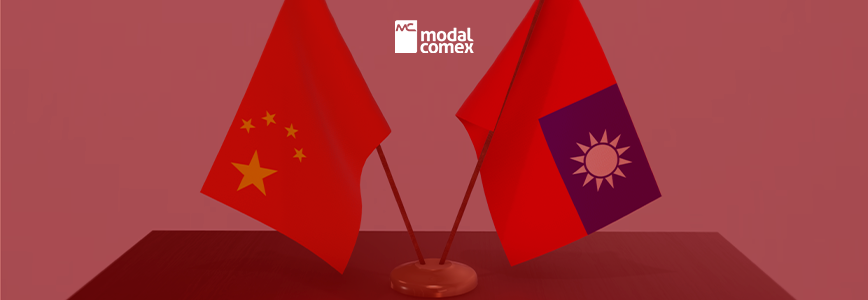Tension between China and Taiwan

Why did an unexpected visit by US House Speaker Nancy Pelosi to Taiwan leave China furious?
Today on Modal’s blog we will show the geopolitical conflict between China and Taiwan and the influence of the United States in this conflict.
You will see in this post:
History of tension between China and Taiwan
Visit from Nancy Pelosi
History of tension between China and Taiwan
The Chinese Revolution of 1949 was the result of a long battle that began shortly after the end of the First World War, after the founding of the Chinese Communist Party (CCP) in 1921. Communists believed that the establishment of the Republic in 1911 and the The rise of the nationalist party did not lead to an effective sovereign state, nor did they foresee profound social reforms that would improve the lives of Chinese urban and rural workers.
Since then, China has experienced alternating periods of civil war and alliances between nationalists and communists, with the two groups fighting together against foreign aggression – such as the Japanese invasion in the 1930s and during World War II. The end of World War II and the expulsion of Japanese troops from Chinese territory inaugurated a new period of intense struggle for power between nationalists and communists.
Nationalist leader Chiang Kai-shek (1887-1975) could not resist the attack by the Peasant guerrillas under the command of Communist Party leader Mao Zedong. On October 1, 1949, Mao Zedong proclaimed the People’s Republic of China and reorganized the country along communist lines, with land collectivization and confiscation of large companies under state control.
Chiang Kai-shek took refuge on the island of Taiwan (Formosa) and founded the Republic of China. Even today, the self-proclaimed “real China”, Taiwan is seen as a “rebellious province” by the Beijing government.
Visit from Nancy Pelosi
The visit of the Speaker of the United States House of Representatives, Nancy Pelosi, on Tuesday (02/08), to Taiwan is an intervention in China’s internal affairs and goes against the internationally recognized One China principle, said the coordinator from the Brazil-China Studies Center at Fundação Getúlio Vargas (FGV), Evandro Menezes de Carvalho.
“Nancy Pelosi’s visit to Taiwan is an external intervention in domestic matters, which is prohibited by international law,” said Carvalho, who has a doctorate in International Law and a professor at FGV and Universidade Federal Fluminense (UFF). He highlighted that the Taiwan issue is China’s internal matter.
Carvalho criticized the style of diplomacy exercised by the United States, which he described as “confrontational”, unlike China, which opts for dialogue.
Chinese Foreign Minister Wang Yi lashed out at US House Speaker Nancy Pelosi on Wednesday, calling her visit to Taiwan a “complete farce” and warning that “those who play with fire will perish.”
“The United States is violating China’s sovereignty under the pretext of democracy,” Wang told reporters during a meeting with Asean (Association of Southeast Asian Nations) foreign ministers in Cambodia.
In a statement, the Chinese Foreign Ministry criticized Pelosi for “brazenly” going ahead with her visit, alleging that she “maliciously infringes on China’s sovereignty and brazenly engages in political provocations.”
“This proves once again that some US politicians have become ‘troublemakers’ of China-US relations,” the statement said.


